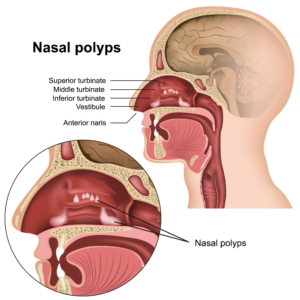Nasal polyposis or nasal polyps is a common condition affecting nearly four percent of the population worldwide. Nasal polyposis is characterized by noncancerous, soft, and usually painless growths inside the lining of nasal passages or sinuses. It looks like a small drop or grape that blocks the nasal passages and becomes the major reason for prolonged nasal congestion.
Causes and Risk Factors of Nasal Polyposis
The exact causes of nasal polyposis are not known but, they tend to cause chronic inflammation of nasal mucosa which is usually a result of certain allergies or infections. Some patients with the following conditions are prone to develop nasal polyposis and make up almost 10% of all cases of nasal polyposis
- Asthma
- Recurring infection
- Certain immune disorders
- Family history of nasal polyposis
- Cystic fibrosis
- Allergies
- Drug sensitivity
People of all age groups may get nasal polyposis, however, young to middle-aged people are at greater risk of developing this condition.
Symptoms:
Nasal polyposis can block nasal passages which cause nasal congestion and produce the following symptoms:

Complications of Nasal Polyposis:
Prolonged inflammation and swelling bloc the normal airway passages and may result in long-term complications, given as follows:

Diagnosis of Nasal Polyposis:
The diagnosis of nasal polyposis is usually made through a careful and detailed physical and nasal examination.
The diagnostic tests useful for carrying out the diagnosis are:
- Nasal endoscopy for detailed nasal examination
- Allergic tests to find out the allergens causing chronic inflammation of the nasal area
- Non-invasive sweat test for cystic fibrosis
- Imaging tests such as CT scans to find out the location and size of polyposis
- Blood test to rule out vitamin D deficiency
Treatment
The overall treatment goal is to eradicate polyposis and if not, at least, reduce the size of polyposis. There are two approaches to the treatment; medications and surgery. Medications are usually the first treatment of choice; however, surgery is the only option when the patient does not improve with the medications. Functional endoscopic sinus surgery is one of the minimally invasive and latest advancements in ENT to get rid of chronic nasal polyposis. A significant improvement in the patient’s recurrent acute or chronic infective sinusitis symptoms is observed following surgery.

Prevention of Nasal Polyposis
Living with nasal polyposis is difficult and there are few measures that one can adopt to prevent it:
- The medications for allergy and asthma should be regularly taken as per the doctor’s instructions
- Saline nasal rinse or spray should be used to get rid of the allergens or irritants responsible for causing nasal polyps
- Good hygiene should be practiced.
- A humidifier should be used at home to keep the airways moist
As nasal polyposis may occur time and again, it is best to follow the doctor’s advice and take essential precautions to avoid bothersome symptoms.


